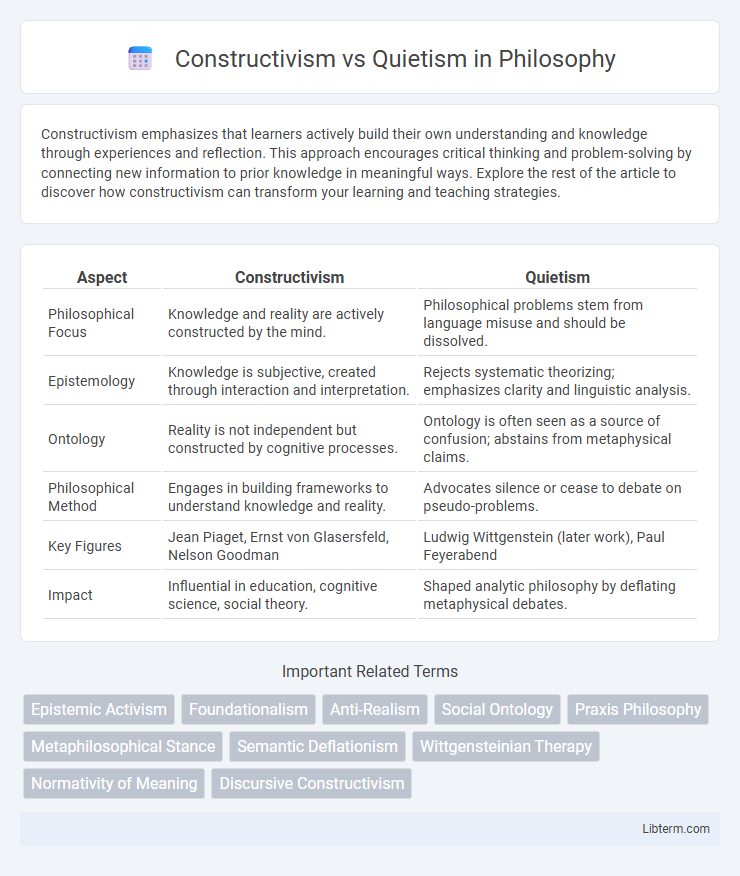Constructivism emphasizes that learners actively build their own understanding and knowledge through experiences and reflection. This approach encourages critical thinking and problem-solving by connecting new information to prior knowledge in meaningful ways. Explore the rest of the article to discover how constructivism can transform your learning and teaching strategies.
Table of Comparison
| Aspect | Constructivism | Quietism |
|---|---|---|
| Philosophical Focus | Knowledge and reality are actively constructed by the mind. | Philosophical problems stem from language misuse and should be dissolved. |
| Epistemology | Knowledge is subjective, created through interaction and interpretation. | Rejects systematic theorizing; emphasizes clarity and linguistic analysis. |
| Ontology | Reality is not independent but constructed by cognitive processes. | Ontology is often seen as a source of confusion; abstains from metaphysical claims. |
| Philosophical Method | Engages in building frameworks to understand knowledge and reality. | Advocates silence or cease to debate on pseudo-problems. |
| Key Figures | Jean Piaget, Ernst von Glasersfeld, Nelson Goodman | Ludwig Wittgenstein (later work), Paul Feyerabend |
| Impact | Influential in education, cognitive science, social theory. | Shaped analytic philosophy by deflating metaphysical debates. |
Introduction to Constructivism and Quietism
Constructivism emphasizes the active role of individuals in shaping knowledge through experiences and interactions, highlighting the importance of context and social constructs in learning processes. Quietism, by contrast, advocates for a passive acceptance of knowledge, emphasizing observation and non-interference rather than active engagement or manipulation of understanding. These philosophical stances differ fundamentally in their approach to epistemology, with constructivism promoting constructive participation and quietism favoring contemplative receptivity.
Core Principles of Constructivism
Constructivism emphasizes that international relations are socially constructed through shared ideas, norms, and identities rather than material forces alone. It posits that state behavior is shaped by collective beliefs and the intersubjective understanding within the international system. Core principles include the importance of norms, the role of identity in shaping interests, and the dynamic nature of social structures influencing global politics.
Core Principles of Quietism
Quietism emphasizes inner tranquility and the suspension of active judgment to achieve spiritual peace, rejecting aggressive philosophical debates. Core principles include the pursuit of passivity in thought, detachment from worldly concerns, and reliance on innate divine illumination over rational argumentation. Quietism contrasts with constructivism by prioritizing contemplative silence and acceptance rather than the active construction of knowledge or social reality.
Historical Origins and Development
Constructivism emerged in the early 20th century as an artistic and architectural movement centered on abstract, geometric forms and the use of modern materials, originating primarily in Russia with figures like Vladimir Tatlin and the Constructivist group. Quietism, rooted in 17th-century philosophical and religious traditions, particularly within Catholic mysticism, emphasizes inner peace and contemplative stillness, with influential proponents like Miguel de Molinos advocating passive spirituality. The development of Constructivism aligned with industrial progress and political revolution, while Quietism evolved through theological debates and ecclesiastical scrutiny over spiritual practice.
Key Philosophers and Thinkers
Constructivism, championed by philosophers like Ernst von Glasersfeld and Jean Piaget, emphasizes the active role of learners in constructing knowledge through experience and interaction. Quietism, associated with thinkers such as Ludwig Wittgenstein and Richard Rorty, advocates for a skeptical approach that suspends theoretical assertions and focuses on language use and everyday practices. These contrasting philosophies highlight different views on knowledge acquisition and the purpose of philosophical inquiry.
Epistemological Differences
Constructivism asserts that knowledge is actively constructed by individuals through experiences and social interactions, emphasizing the subjective nature of understanding. Quietism, on the other hand, maintains that knowledge emerges from passively accepting phenomena without imposing conceptual frameworks, prioritizing a non-interventionist epistemology. These contrasting approaches highlight the divergent views on whether knowledge is shaped by mental activities or revealed through a contemplative suspension of judgment.
Impact on Ethics and Morality
Constructivism shapes ethics and morality through the active role of agents in creating norms based on social interactions and shared understandings, emphasizing the fluidity and context-dependence of moral principles. Quietism, by contrast, advocates for refraining from deep ethical theorizing and conceptual disputes, promoting clarity and practical wisdom by focusing on ordinary language and lived experience over abstract moral constructs. This divergence impacts ethical deliberation, with constructivism encouraging normative innovation and quietism fostering ethical restraint and humility.
Applications in Education and Politics
Constructivism in education emphasizes active student engagement and knowledge construction through experience, promoting critical thinking and problem-solving skills, while Quietism advocates for a more passive, reflective learning approach, minimizing direct intervention. In politics, constructivism highlights the role of social constructs and shared ideas in shaping political realities and policymaking, encouraging participatory governance and dialogue. Quietism, by contrast, stresses restraint and non-interference in political affairs, valuing stability and gradual change over activism or ideological imposition.
Criticisms and Controversies
Criticisms of constructivism highlight its potential to overemphasize social constructs at the expense of material realities, leading to allegations of relativism and skepticism about objective truths. Quietism faces controversies for its passive approach to political and social issues, criticized for potentially enabling systemic injustices by avoiding active engagement or intervention. Both frameworks provoke intense debate regarding their practical implications in political theory and international relations, challenging scholars to reconcile theory with real-world complexities.
Conclusion: Comparative Insights
Constructivism emphasizes active knowledge-building through experience and interaction, promoting cognitive development and problem-solving skills. Quietism advocates for a more passive educational approach, encouraging observation, reflection, and minimal intervention to foster natural understanding. Comparing these perspectives reveals constructivism's dynamic engagement contrasts with quietism's contemplative steadiness, offering complementary strategies for diverse learning environments.
Constructivism Infographic

 libterm.com
libterm.com